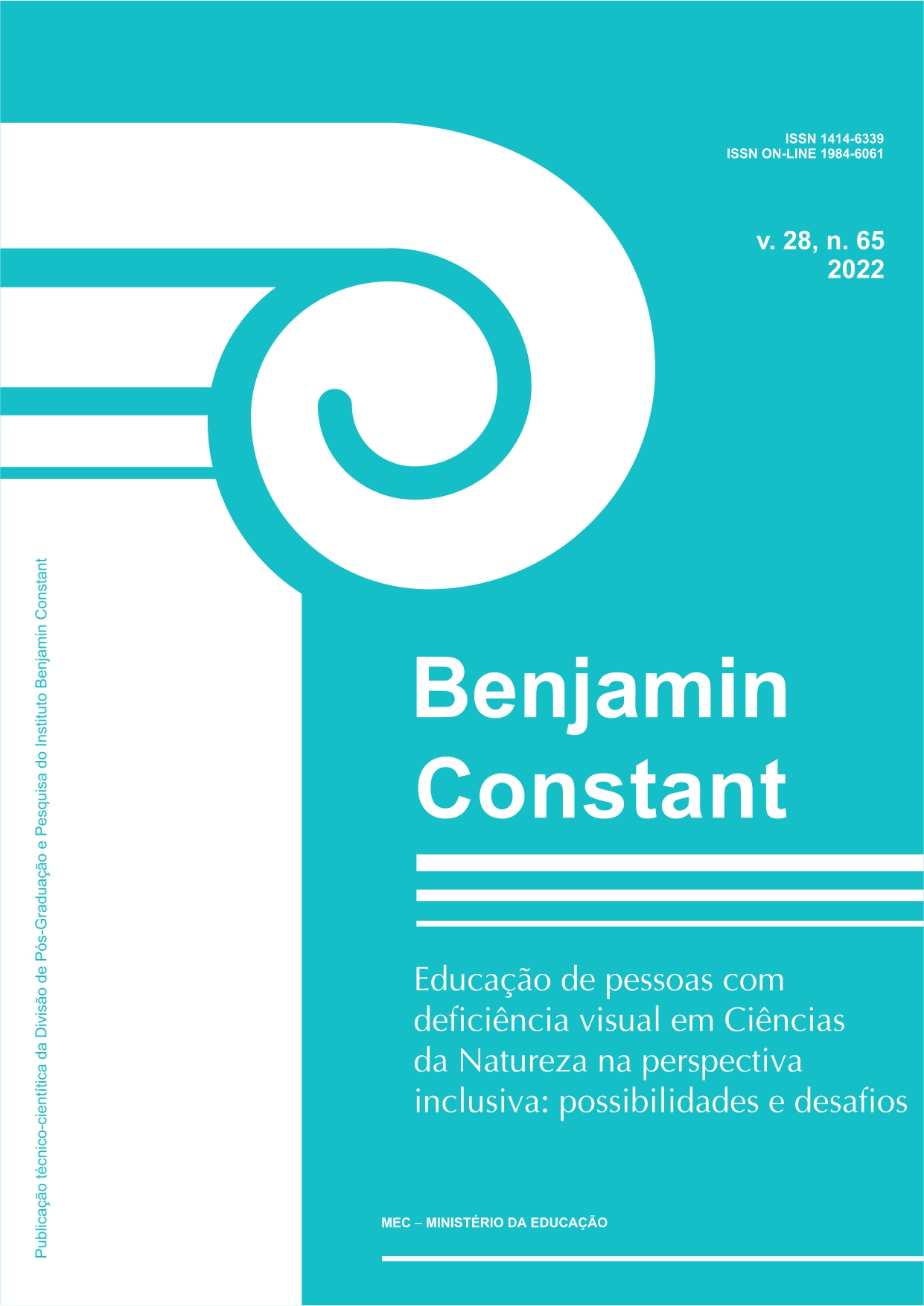Face to face with parasites
an interactive game for blind students
Abstract
In the school environment there is a notorious use of visual resources such as graphics, images and videos that make it difficult for visually impaired students to learn certain contents. To work with Special Education for blind people to look for psychopedagogical interventions according to the needs of each child. Games adapted for blind students represent a possibility of teaching in a different way, associating the ludic with obtaining information. In this context, this article describes an investigation that involved the elaboration and evaluation process of a didactic game aimed at blind students, which seeks to contribute to the teaching and learning process of the main intestinal parasites. The construction uses attractive and low-cost materials, contributing to the teaching of a theme that involves the human body and health promotion, and that is part of the lives of school-age children. This paper is the result of the master’s thesis “Face to face with the parasites: an interactive game for blind students”, defended in 2020 in the master’s program in Science and Mathematics Education at PUC Minas Gerais. A distinctive feature of the game is that it allows blind children to play together with sighted children and have the same success/win conditions. The game cards were created to allow the players to work on different aspects related to the main intestinal parasites. The game strategy was designed to provide, in addition to fun, cooperation and involvement between players. The results of the evaluation with this public showed that the “Face to face with the parasites” motivated interaction, fun, dissemination of information, redefinition of concepts and, consequently, could contribute to the teaching and learning process and to the construction of knowledge about parasites.
References
ANDRADE, Fernanda et al. Parasitoses Intestinais em um Centro de Educação Infantil Público do Município de Blumenau, SC, BRASIL, com ênfase em Cryptosporidium spp e outros protozoários. Revista de Patologia Tropical, Goiânia, v. 37, n. 4, out./dez. 2008.
BEVILAQUA, Elís Josiane; GUEDES, Anibal Lopes; LEPKE, Sonize. Propostas educativas envolvendo jogos e artefatos robóticos na educação básica para deficientes visuais. A MARgem, Uberlândia, v. 18, n. 2, jul./dez. 2021.
BRASIL. Lei n° 13.146, de 06 de julho de 2015. Institui a Lei Brasileira de Inclusão da pessoa com deficiência (Estatuto da pessoa com deficiência). Diário Oficial da União, Brasília, n. 127, seção 1, 06 jul. 2015.
BRASIL. Presidência da República. Decreto nº 5.296, de 02 de dezembro de 2004. Disponível em http://www.planalto.gov.br/ccivil_03/_ato2004-2006/2004/decreto/d5296.htm. Acesso em: 04 out. 2022.
CERQUEIRA, Jonir Bechara; FERREIRA, Elisa de Melo Borba. Recursos didáticos na educação especial. Revista Benjamin Constant, Rio de Janeiro, n. 15, 2000.
DANTAS, André. Luiz. P.; PINTO, Gabriela. Rezende.; SENA, Claudia. Pinto. Apresentando o BEM: Um Objeto de Aprendizagem para mediar o processo educacional de crianças com deficiência visual e videntes nas operações básicas de Matemática. In: CONGRESSO BRASILEIRO DE INFORMÁTICA NA EDUCAÇÃO ; 2, SIMPÓSIO BRASILEIRO DE INFORMÁTICA NA EDUCAÇÃO. 24, 2013, Campinas. Anais [...]. Campinas: Sociedade Brasileira de Computação, 2013.
DE ABREU, Luiz Carlos et al. A epistemologia genética de Piaget e o construtivismo. Journal of Human Growth and Development, v. 20, n. 2, p. 361-366, 2010.
MATOZINHOS, Camila Ribeiro de. O ensino de verminoses para alunos cegos do ensino fundamental com a utilização de materiais didáticos tridimensionais. Dissertação (Mestrado em Ensino de Ciências) – Instituto de Ciências Exatas e Biológicas, Universidade Federal de Ouro Preto, Ouro Preto, 2017.
PÉREZ, María García; BARROS, Daniela Melaré Vieira; SÁNCHEZ, Isabel Ortega. Diretrizes para uma metodologia de alfabetização digital na modalidade virtual. [S. l.; s. n.], 2008. Disponível em: <https://repositorioaberto.uab.pt/bitstream/10400.2/3345/1/resumen%20virtualeduca2008.pdf>. Acesso em: 21 dez. 2022.
PIAGET, Jean; DAEIR, Zilda Abujamra. Sabedoria e ilusões da filosofia. São Paulo: Difusão Européia do Livro, 1969.
PIERINI, Lívia et al. Brinquedos Numéricos: um jogo para o ensino dos conjuntos numéricos. In: CONGRESSO BRASILEIRO DE INFORMÁTICA NA EDUCAÇÃO; SIMPÓSIO BRASILEIRO DE INFORMÁTICA NA EDUCAÇÃO, 23, 2012, Rio de Janeiro. Anais [...]. Rio de Janeiro: Sociedade Brasileira de Computação, 2012.
PRADO, Waléria Freitas Oliveira. Elaboração, produção e análise de jogos grafo-táteis em Poliácido Lático (PLA) e Medium Density Fiberboard (MDF) para educação infantil. 188 f. Dissertação (Mestrado em Ensino na Educação Básica) – Universidade Federal de Goiás, Goiânia, 2022.
RIZZO et al. O ensino de doenças microbianas para o aluno com surdez: um diálogo possível com a utilização de material acessível. Revista Educação Especial, Santa Maria, v. 27, n. 50, p. 765-776, set./dez. 2014.
SÁ, Elizabet Dias; CAMPOS, Izilda Maria de; SILVA, Myriam Beatriz Campolina. Inclusão escolar de alunos cegos e com baixa visão. In: SÁ, Elizabet Dias; CAMPOS, Izilda Maria de; SILVA, Myriam Beatriz Campolina. Atendimento educacional especializado: deficiência visual. Brasília: Ministério da Educação: Secretaria de Educação a Distância: Secretaria de Educação Especial, , 2007. p. 13-38.
SILVA, Rosiani; PAULA, Melise; SARLAS, Liane. Utilização de jogos para pessoas com necessidades educativas especiais: uma análise experimental. In: SIMPÓSIO BRASILEIRO DE INFORMÁTICA NA EDUCAÇÃO, 22; WORKSHOP DE INFORMÁTICA NA ESCOLA, 17, Aracaju, 2011. Anais [...]. Aracaju: Sociedade Brasileira de Computação, 2011.
SILVA, Luciene M. da. O estranhamento causado pela deficiência: preconceito e experiência. Revista Brasileira de Educação, Rio de Janeiro, v. 11, n. 33, p. 424-561, set./dez. 2006. Disponível em: <http://www.scielo.br/pdf/rbedu/v11n33/a04v1133.pdf>. Acesso em: 20 ago. 2018.
SILVEIRA, Alice Diesel; LOGUERCIO, Luciano Canto; SPERB, Tania Mara. A brincadeira simbólica de crianças deficientes visuais pré-escolares. Revista Brasileira de Educação Especial, Marília, v. 6, n. 1, p. 133-146, 2000.
VYGOTSKY, Lev Semenovitch. A Formação Social da mente. São Paulo: Martins Fontes, 1984.





.png)
